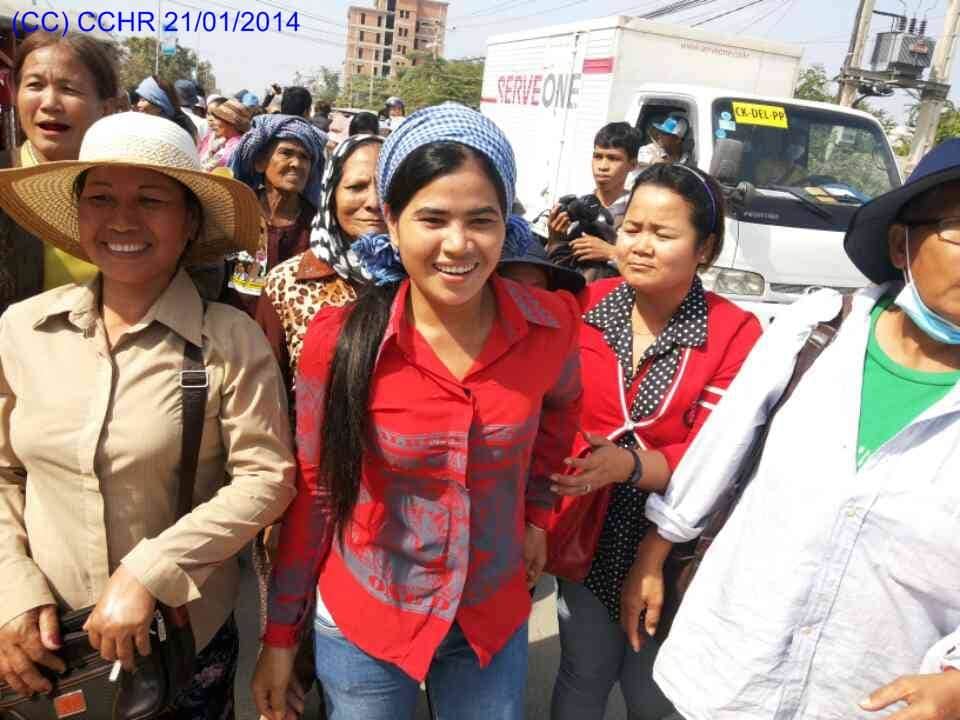On 21 January, eleven human rights activists and peaceful protesters were temporarily arrested and taken to the Phnom Penh Municipal Police Station. These temporary arrests are not an isolated case, but rather emerge as a new tactic by the Royal Government of Cambodia to silence the population.
On 21 January 2014, the Cambodian Center for Human Rights (“CCHR”) called for the immediate lift of the current ban on assemblies and for a halt to the subsequent wave of detention of human rights activists. On 4 January 2014, the Ministry of Interior announced a ban on assemblies, demonstrations, and marches until “public order and security are restored.” Since the announcement human rights activists and peaceful protesters have been systematically temporarily arrested and required to sign letters agreeing to cease demonstrating.
On 21 January, eleven human rights activists and peaceful protesters were temporarily arrested by Daun Penh security guards and taken to the Phnom Penh Municipal Police Station. Among the 11 arrested were Rong Chun, President of the Cambodian Independent Teachers Association (“CITA”), Tep Vanny and Yorm Bopha along with seven other Boeng Kak Lake activists, a staff member of Housing Rights Task Force (“HRTF”) and an activist from the Cambodian Alliance of Trade Unions (“CATU”). The arrest took place during a demonstration that started in front of the Embassy of the United States to deliver a petition calling for the release of the 23 people jailed during the violent crackdown on garment workers demonstrations earlier this month. All eleven people arrested on the morning of 21 January were released in the afternoon after signing a letter stating they will not incite or take part in further illegal activities or demonstrations.
These temporary arrests are not an isolated case, but rather emerge as a new tactic by the Royal Government of Cambodia (the “RGC”) to silence the population. On 6 January and on 19 January respectively, five Boeng Kak Lake activists and Sok Chhun Oeung, acting President of the Independent Democracy of Informal Economy Association (“IDEA”), were also temporarily arrested while attempting to protest and subsequently released after signing a similar letter.
The current ban on assemblies is unlawful, seriously disproportionate and excessively broad and thus is in clear violation of international and domestic provisions protecting the right to freedom of assembly, including the Constitution of the Kingdom of Cambodia. According to international law, derogations to the right to peaceful assembly must respond to the exigencies of the situation: for instance, in emergency situations which threaten the life of the nation. They must also be officially proclaimed. Neither of these conditions has been fulfilled in the current case.
CCHR President Ou Virak comments:
“In light of the past weeks’ events, it seems Cambodia is now in a de-facto, unlawful state of emergency, as the current situation in the capital cannot by any stretch qualify as an emergency situation threatening the life of the nation. The only thing currently under threat is the authority and legitimacy of the RGC. It is thus clear that such a broad ban on assemblies and the subsequent arrests are politically motivated and serve only the purpose of protecting the current government from criticism by garment workers and the political opposition, and not the population of Cambodia.”
Opposition CNRP meeting cancelled due to ruling party intimidation
In a separate incident, a meeting of the opposition Cambodian National Rescue Party (“CNRP”) in Troeuy Sla commune in Kandal province was cancelled on 21 January 2014 after several hundreds of Cambodian People’s Party (“CPP”) supporters and riot and military police armed with tear gas canisters, shields and batons were standing at the meeting venue.
The meeting was postponed, shortly before CNRP leaders Sam Rainsy and Kem Sokha were scheduled to arrive, reportedly to avoid bloodshed and violence, in light of the heavy presence of security forces. The CNRP had received approval for the meeting from Interior Minister Sar Kheng earlier on 21 January.
The prevention of the CNRP to exert their right to freedom of peaceful assembly, protected under Article 41 of the Constitution of the Kingdom of Cambodia (the “Constitution”) and Article 21 of the International Covenant on Civil and Political Rights (the “ICCPR”), ratified by Cambodia in 1992, is the latest in the series of recent violations of the right to freedom of assembly . . . Yet on Saturday, 18 January 2014, Prime Minister Hun Sen called onto CPP supporters to demonstrate and “oppose all acts that lack responsibility and have the characteristics of a coup.”
The display of threatening security forces and CPP supporters is a clear message aimed at restricting the CNRP’s freedom of expression. In addition, not only is the current ban on assemblies in contradiction with Cambodia’s domestic and international legal obligations, but it is also clear that it is only an attempt by the RGC to silence its critics.



